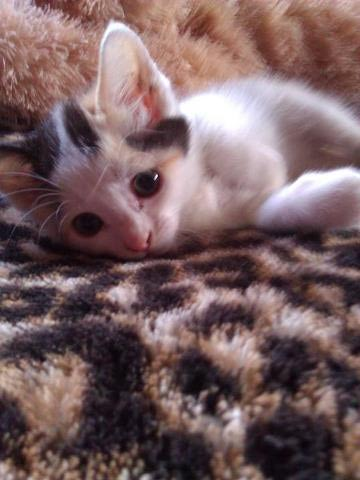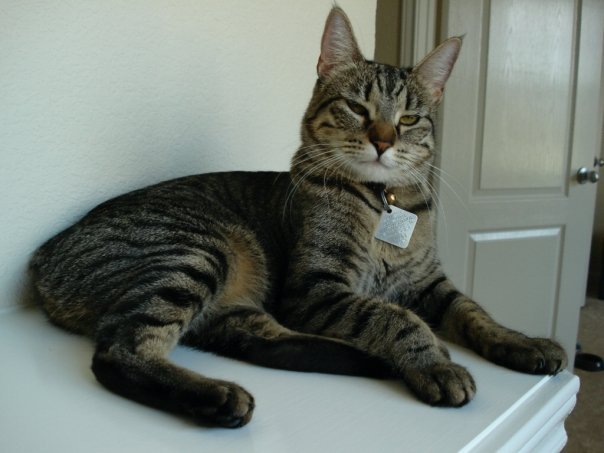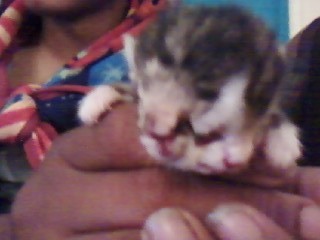QuestionHi, Ali . . . I have a one-year old neutered male that is the sweetest cat I've ever had. But after a few months of throwing up, diarrhea, and mouth ulcers, we determined he was allergic to certain proteins and now he eats a prescription diet cat food. This has helped quite a bit, but he still has some periodic symptoms. My question is: Do cats often outgrow food allergies? If so, how long do they need prescription food and periodic steroids? Thanks for your help . . .
AnswerKym, my oldest cat developed food allergies when she was 7. She became exceedingly itchy to the point that she removed her fur on her tummy and left little scabs. I was advised by my own vet to find a food with a different protein source, one not usually found in pet food, look for things like venison, rabbit.... I was also advised to treat short term with anti histamines. It sounds like your cat has certainly had a violent reaction to something. In my experience it may not be just the food though. He may have a sensitive tummy, Royal Canin makes a great sensitive tummy food that is okay if you are only feeding one cat as it can be a bit pricey. My other 2 cats decided that they enjoyed my oldest cat's diet more than their own, so it wasn't practical to experiment with some of the pricier foods. If he is fine don't mess with it. The next time he has a flare up take note not just of his food, but of his environment. Did you feed him something from your plate? Did he steal something from the trash? Anything that you can think of may be a contributing factor. The mouth ulcers have me concerned that food may not be the full cause of this. I know that it is tough to feed your cat a prescription diet, I know it bothered me because my oldest cat loves treats and I didn't have the heart to treat the others and leave her out. Your local butcher will likely carry bison, which is different enough that my cat tolerates it without flaring up. Make sure that you choose high quality cuts, as well as things that are different. Bison, lamb, rabbit, duck from a butcher that is well cooked may be something to try. If he tolerates something particularly well, look for a food where that is the base. Try to avoid artificial preservatives, grains and other fillers. This will make the search for a high quality well tolerated food narrow and expensive, but finding the right one is worth it. Don't feed too much variety in the meat. Try one food at a time, stick with that one for a month or so while watching for a reaction. If there isn't a reaction in the month or two that follow you are all clear with that food. He will likely not outgrow the allergies in my experience. My vet practices homeopathy as well as conventional medicine and I have found that she offers down to earth and common sense solutions. I am wondering if you vaccinated your kitty around the time of his first reaction. Vaccine reactions are fairly common in cats. There is good current evidence to suggest that cats need only to be vaccinated once properly and then if you wish to continue it is best to cycle the vaccines. If a cat or dog has a history of reacting to vaccines my vet will not administer them anymore. The studies I refer to have also found that cats vaccinated as per old recommendations are at increased risk for developing auto immune antigens that cause kidney failure in older cats, so I urge you to do the research before his next needles are due. I realize that by law you must vaccinate for rabies in most areas, but if your cat is an indoor cat and has had the reaction you describe your vet can exempt him from further vaccines. This is ultimately your choice as a pet owner. I personally agree with my vet's choice to not vaccinate my animals further and I do believe that it is your decision and certainly in your and kitty's best interests for you to do the research. If you have any further questions, please do not hesitate to contact me.

 my first kitten
QuestionQUESTION: hi im just wondering if u know what k
my first kitten
QuestionQUESTION: hi im just wondering if u know what k
 blackened area under lower jaw
Question
Daisy
My Daisy is a 12 year old short-h
blackened area under lower jaw
Question
Daisy
My Daisy is a 12 year old short-h
 Stray kitten
Question
My Kitten
Hi i was wondering how much t
Stray kitten
Question
My Kitten
Hi i was wondering how much t
 Reclusive kitten
QuestionMy cousin found an abandoned kitten and where s
Reclusive kitten
QuestionMy cousin found an abandoned kitten and where s
 my cat had a kitten with one head and part of another with a mouth and has not nursed since she was born.
Question
my newborn kitten
my cat delivered a female ki
my cat had a kitten with one head and part of another with a mouth and has not nursed since she was born.
Question
my newborn kitten
my cat delivered a female ki